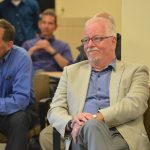Join the University of Buckingham’s CREATE-hub researcher Dr. Gill Hill as she talks about her creativity research alongside Professor James Kaufman, in the latest BPS Research Digest podcast.
How to Boost Your Creativity
September 17, 2019
September 17, 2019
Join the University of Buckingham’s CREATE-hub researcher Dr. Gill Hill as she talks about her creativity research alongside Professor James Kaufman, in the latest BPS Research Digest podcast.
September 17, 2019
“The Landscape isn’t much different than the original Adversity Index, other than [that] the College Board [is] reporting separate scores for the high school and neighborhood indices, and students now can receive their score along with colleges,” Casey Cobb said. “I think the biggest change was the name. They switched it to Landscape to deflect criticism that the scores validly measure adversity.”

September 16, 2019
Congratulations to our Neag School alumni, faculty, staff, and students on their continued accomplishments inside and outside the classroom. If you have an accolade to share, we want to hear from you! Please send any news items and story ideas to neag-communications@uconn.edu.
September 16, 2019
“The spirit of what I’ve always wanted to do with this course is have it live beyond the classroom,” Doug Glanville said. “It’s one thing to have a classroom of a finite group of students. It’s another thing when you’re able to bring it to the student body and to the community.”

September 13, 2019
After almost four decades of dedicated service, Brown retired Aug. 31, with a ground-breaking career and legacy that will continue to influence the University for years to come. Neag School and University faculty, past colleagues, current and former students, friends, and Brown’s family members came together earlier this month to celebrate him and his career.
September 6, 2019
“It’s redistributing money from municipalities that were receiving it under the formula,” Casey Cobb says. “And that might be the right thing to do, ultimately. It’s just that, I think, politically, it tends not to be too popular to pull money away, because of course, everybody wants to receive it.”
September 4, 2019
“When I taught middle school students about finding trustworthy sources online a decade ago, internet connections and processors were still so slow that the hunt for multiple sources to confirm a finding took so much effort that analysis and interpretation was a much smaller part of the equation,” says Rachael Gabriel.
September 4, 2019
“The recent controversy over the elimination of gifted education programs in New York City’s public schools must be viewed in the larger context of the role that schools need to play in changing world conditions, career development opportunities, the job market and the ways in which we can better prepare all of our young people for happy and productive futures,” says Renzulli and Reis.
August 29, 2019
Greenwich educator Ian Tiedemann has been awarded the Council for Economic Education’s 2019 Alfred P. Sloan Foundation Teaching Champion Award, which recognizes excellence in economic education.
August 21, 2019
“There were times throughout my youth that I think people had lower expectations than they should have. It just made me hungrier,” says Education Commissioner Miguel Cardona.